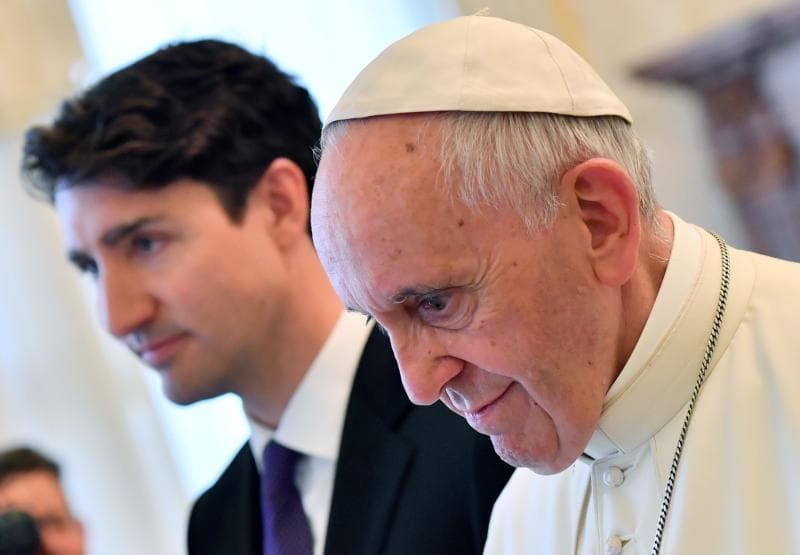ROME – On Wednesday the Canadian bishops confirmed that when a delegation of the country’s First Nations communities visit Rome next month, they will have private meetings with Pope Francis to discuss healing and a possible papal visit.
In a statement from the Canadian Conference of Catholic Bishops (CCCB), it was confirmed that around 25-30 indigenous will travel as part of the delegation visiting the Vatican from Dec. 17-20, accompanied by a small group of Canadian bishops.
Indigenous traveling as part of the delegation come from the First Nations, Inuit, and Métis communities, and include Elders, knowledge keepers, residential school survivors, and youth.
Bishop Raymond Poisson of Saint-Jérôme, president of the CCCB, said the delegation has been planned through an ongoing dialogue with the Assembly of First Nations, the Métis National Council, the Inuit Tapiriit Kanatami, and other Indigenous leaders in Canada.
“The journey towards healing and reconciliation is a long one, but we believe this will be a significant milestone in the Catholic Church’s commitment to renewing, strengthening and reconciling relationships with Indigenous Peoples across the land,” he said.
Through the delegation, he said, “we hope to walk together in a new way, to listen with humility, and to discern the next steps that the Church can take to support residential school survivors, their families, and their communities.”
While specific travel plans and itineraries are being coordinated directly with the delegates, the bishops said that Vatican officials have confirmed that Pope Francis will hold individual private audiences with delegates from the First Nations, Inuit, and Métis communities “to hear their personal stories of the lasting legacy of residential schools.”
Delegates, the bishops said, will also “have the opportunity to speak with the Holy Father about their hopes and expectations for his eventual pilgrimage to Canada.”
Last month the Vatican announced Pope Francis’s intention to visit Canada as part of the Church’s effort to continue the process of healing and reconciliation with indigenous peoples, but they did not offer a timeframe for when the visit could place.
RELATED: Pope willing to visit Canada as part of ‘reconciliation process’ with First Nations
For years, the Catholic Church has faced pressure for its treatment of indigenous communities in Canada, largely due to its role in Canada’s residential school program for indigenous children.
Tensions escalated over the summer after the remains of 215 children were discovered on the grounds of the Indian Residential School in Kamloops at the end of May, prompting further searches at other schools that unearthed hundreds more bodies.
Amid public outrage, there were numerous calls on the Canadian bishops, and the pope, to offer a formal apology.
While individual congregations and missionary communities who were historically responsible for residential schools have made apologies over the years, there has been no apology on an institutional level.
Although the Canadian bishops themselves did eventually issue a collective apology after the discovery of the remains over the summer, Pope Francis has not, even request was specifically made by Canada’s Truth and Reconciliation Commission at the conclusion of its work in 2015.
Indigenous communities themselves have pressured the pope to not only make this apology, but to do it on Canadian soil for added symbolism.
Pope Francis’s willingness to travel to Canada, then, and to meet privately with indigenous communities so soon after the Kamloops discovery, holds significant value.
In their statement, the Canadian bishops noted that during the December visit of the delegations, in addition to the 25-30 formal delegates, a number of other indigenous individuals have also been invited to participate and will attend a final audience with Pope Francis at the end of the visit.
Both the Canadian bishops and the indigenous representatives involved in planning have agreed to have as a theme for the December visit, “Indigenous Peoples and the Church: Walking Together Toward Healing and Reconciliation.”
Indigenous delegates who will attend hail from across Canada, representing different traditional, faith, and linguistic backgrounds, each of whom “brings their own perspective on the history of colonialism and residential schools,” the bishops said.
The Canadian bishops are covering the cost of travel and lodging for the delegation, and they have asked that a number of mental health workers accompany the group “in recognition of the painful sentiments that may be experienced by many delegates.”
Follow Elise Ann Allen on Twitter: @eliseannallen















